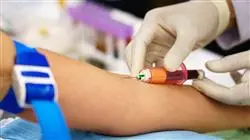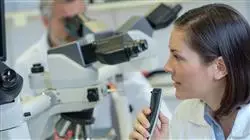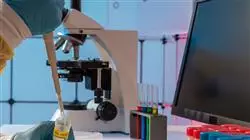University certificate
The world's largest faculty of nursing”
Why study at TECH?
This Postgraduate diploma has a comprehensive program for nurses who wish to prepare themselves in Clinical Trials”

The advances of recent years have meant for the medical sector and the public in general a success in terms of obtaining new pharmacological products, for this reason the Clinical Trials, a field that studies and conducts research during the scientific process is responsible for making experimental assessments to give the endorsement to a drug.
In this way, the students will enter into the study of preclinical drug research, that is, from the discovery of its bases to its publication, which will allow them to be related from beginning to end in a process that brings medical benefits worldwide, which in many cases have served to cure diseases and help in clinical treatments.
In addition, the essential concepts to support the complexity at the methodological and semantic level of Clinical Trials are addressed. It should be noted that, within the clinical trial process, the figure of the nurses is of great importance, since they perform a series of essential tasks and responsibilities that guarantee the quality of the drug samples under investigation.
All of the above makes this Postgraduate diploma one of the most up-to-date and complete programs on the market, and offers the healthcare professional a general vision of Clinical Trials, but with special and particular cases in which these investigations have been extremely important and beneficial. In addition to having a 100% online modality, with downloadable material and access to the virtual campus from any device with internet connection.
Broaden your knowledge through this Postgraduate diploma that will enable you to achieve excellence in this field"
This Postgraduate diploma in Clinical Trials for Nursing contains the most complete and up-to-date scientific program on the market. The most important features include:
- The development of case studies presented by experts in Clinical Trials
- The graphic, schematic, and practical contents with which they are created, provide scientific and practical information on the disciplines that are essential for professional practice
- New developments in Clinical Trials
- Practical exercises where the self-assessment process can be carried out to improve learning
- Special emphasis on innovative methodologies in Clinical Trials
- Theoretical lessons, questions to the expert, debate forums on controversial topics, and individual reflection assignments
- Content that is accessible from any fixed or portable device with an internet connection
This Postgraduate diploma is the best investment you can make when selecting a refresher program, for two reasons: in addition to updating your knowledge in Clinical Trials for Nursing, you will obtain a Postgraduate diploma from the leading online university: TECH”
The teaching staff includes professionals from the Health sector, who bring their experience to this educational program, as well as renowned specialists from leading societies and prestigious universities.
Its multimedia content, developed with the latest educational technology, will allow the professional a situated and contextual learning, that is, a simulated environment that will provide an immersive education programmed to prepare in real situations.
This program is designed around Problem-Based Learning, whereby the professional must try to solve the different professional practice situations that arise throughout the program. For this purpose, the professional will be assisted by an innovative interactive video system developed by renowned and experienced experts in the field of Clinical Trials.
Do not hesitate to take this educational program with us. You will find the best teaching material with virtual lessons"

This 100% online Postgraduate diploma will allow you to balance your studies with your professional work while expanding your knowledge in this field"
Syllabus
The structure of the contents has been designed by the best professionals in research and health, with an extensive background and recognized prestige in the profession, backed by the volume of cases reviewed, studied and diagnosed, and with extensive mastery of new technologies.

This Postgraduate diploma in Clinical Trials for Nursing contains the most complete and up-to-date scientific program on the market”
Module 1. Drug research and development
1.1. Development of New Drugs
1.1.1. Introduction
1.1.2. Development Phases of New Drugs
1.1.3. Discovery Phase
1.1.4. Preclinical Phase
1.1.5. Clinical Phase
1.1.6. Approval and Registration
1.2. Discovery of an Active Substance
1.2.1. Pharmacology
1.2.2. Seeding Trials
1.2.3. Pharmacological Interventions
1.3. Pharmacokinetics
1.3.1. Methods of Analysis
1.3.2. Absorption
1.3.3. Distribution
1.3.4. Metabolism
1.3.5. Excretion
1.4. Toxicology
1.4.1. Single Dose Toxicity
1.4.2. Repeated Dose Toxicity
1.4.3. Toxicokinetics
1.4.4. Carcinogenicity
1.4.5. Genotoxicity
1.4.6. Reproductive Toxicity
1.4.7. Tolerance
1.4.8. Dependency
1.5. Regulation of Drugs for Human Use
1.5.1. Introduction
1.5.2. Authorization Procedures
1.5.3. How a Drug is Evaluated: Authorization Dossier
1.5.4. Technical Data Sheet, Package Leaflet and EPAR
1.5.5. Conclusions
1.6. Pharmacovigilance
1.6.1. Pharmacovigilance in Development
1.6.2. Pharmacovigilance in Marketing Authorization
1.6.3. Post-Authorization Pharmacovigilance
1.7. Uses in Special Situations
1.7.1. Introduction
1.7.2. Examples:
1.8. From Authorization to Commercialization
1.8.1. Introduction
1.8.2. Drug Financing
1.8.3. Therapeutic Positioning Reports
1.9. Special Forms of Regulation
1.9.1. Advanced Therapies
1.9.2. Accelerated Approval
1.9.3. Biosimilars
1.9.4. Conditional Approval
1.9.5. Orphan Drugs
1.10. Dissemination of Research
1.10.1. Scientific Article
1.10.2. Types of Scientific Articles
1.10.3. Quality of Research Checklist
1.10.4. Drug Information Sources
Module 2. Clinical Trials I
2.1. Clinical Trials: Fundamental Concepts I
2.1.1. Introduction
2.1.2. Definition of clinical trial (CT)
2.1.3. History of Clinical Trials
2.1.4. Clinical Research
2.1.5. Parties Involved in CTs
2.1.6. Conclusions
2.2. Clinical Trials: Fundamental Concepts II
2.2.1. Standards of Good Clinical Practice
2.2.2. Clinical Trial Protocol and Annexes
2.2.3. Pharmacoeconomic Assessment
2.2.4. Aspects that Could Be Improved in Clinical Trials
2.3. Clinical Trials Classification
2.3.1. Clinical Trials According to their Purpose
2.3.2. Clinical Trials According to the Scope of Research
2.3.3. Clinical Trials Methodology
2.3.4. Treatment Groups
2.3.5. Clinical Trials Masking
2.3.6. Treatment Assignment
2.4. Phase I Clinical Trials
2.4.1. Introduction
2.4.2. Phase I Clinical Trials Characteristics
2.4.3. Phase I Clinical Trials Design
2.4.3.1. Single Dose Trials
2.4.3.2. Multiple Dose Trials
2.4.3.3. Pharmacodynamic Studies
2.4.3.4. Pharmacokinetic Studies
2.4.3.5. Bioavailability and Bioequivalence Studies
2.4.4. Phase I Units
2.4.5. Conclusions
2.5. Non-Commercial Research
2.5.1. Introduction
2.5.2. Start-up of Non-Commercial Clinical Trials
2.5.3. Difficulties of the Independent Promoter
2.5.4. Promotion of Independent Clinical Research
2.5.5. Application for Grants for Non-Commercial Clinical Research
2.5.6. Bibliography
2.6. Equivalence and Non-Inferiority EECC I
2.6.1. Equivalence and Non-Inferiority Clinical Trials
2.6.1.1. Introduction
2.6.1.2. Justification
2.6.1.3. Therapeutic Equivalence and Bioequivalence
2.6.1.4. Concept of Therapeutic Equivalence and Non-Inferiority
2.6.1.5. Objectives
2.6.1.6. Basic Statistical Aspects
2.6.1.7. Intermediate Data Tracking
2.6.1.8. Quality of Equivalence and Non-Inferiority RCTs
2.6.1.9. Post-Equivalence
2.6.2. Conclusions
2.7. Equivalence and Non-Inferiority EECC II
2.7.1. Therapeutic Equivalence in Clinical Practice
2.7.1.1. Level 1: Direct Trials Between 2 Drugs, with Equivalence or Non-Inferiority Design
2.7.1.2. Level 2: Direct Trials Between 2 Drugs, with Statistically Significant Differences, but without Clinical Relevance
2.7.1.3. Level 3: Not Statistically Significant Trials
2.7.1.4. Level 4: Different Trials vs. a Third Common Denominator
2.7.1.5. Level 5: Trials vs. Different Comparators and Observational Studies
2.7.1.6. Supporting Documentation: Reviews, Clinical Practice Guidelines, Recommendations, Expert Opinion, Clinical Judgment
2.7.2. Conclusions
2.8. Guidelines for the Development of a Clinical Trial Protocol
2.8.1. Summary
2.8.2. Index
2.8.3. General Information
2.8.4. Justification
2.8.5. Hypothesis and Objectives of the Trial
2.8.6. Trial Design
2.8.7. Selection and Withdrawal of Subjects
2.8.8. Treatment of Subjects
2.8.9. Efficacy Assessment
2.8.10. Safety Assessment
2.8.10.1. Adverse Events
2.8.10.2. Adverse Events Management
2.8.10.3. Notification of Adverse Events
2.8.11. Statistics
2.8.12. Information and Consent
2.8.13. Conclusions
2.9. Non-Protocol Administrative Aspects of Clinical Trials
2.9.1. Documentation Required for the Start of the Trial
2.9.2. Subject Identification, Recruitment and Selection Records
2.9.3. Source Documents
2.9.4. Data Collection Notebooks (DCNs)
2.9.5. Monitoring
2.9.6. Conclusions
2.10. Data Collection Notebooks (DCNs)
2.10.1. Definition
2.10.2. Function
2.10.3. Importance and Confidentiality
2.10.4. Types of Data Collection Notebooks
2.10.5. Elaboration of the Data Collection Notebook
2.10.5.1. Types of Data
2.10.5.2. Order
2.10.5.3. Graphic Design
2.10.5.4. Filling in the Data
2.10.5.5. Recommendations
2.10.6. Conclusions
Module 3. Clinical Trials II
3.1. Involvement of the Pharmacy Service in the Realization of Clinical Trials Sample Management I
3.1.1. Manufacturing/Importation
3.1.2. Acquisition
3.1.3. Reception
3.1.3.1. Shipment Verification
3.1.3.2. Label Checking
3.1.3.3. Shipment Confirmation
3.1.3.4. Entry Registration
3.1.4. Custody/Storage
3.1.4.1. Expiration Control
3.1.4.2. Relabeling
3.1.4.3. Temperature Control
3.1.5. Sample Prescription Request
3.1.6. Medical Prescription Validation
3.1.7. Dispensing
3.1.7.1. Dispensing Procedure
3.1.7.2. Checking Storage Conditions and Expiration Date
3.1.7.3. Dispensing Act
3.1.7.4. CheckOut
3.2. Involvement of the Pharmacy Service in the Realization of Clinical Trials Sample Management II
3.2.1. Preparation/Conditioning
3.2.1.1. Introduction
3.2.1.2. Exposure Routes and Handler Protection
3.2.1.3. Centralized Preparation Unit
3.2.1.4. Facilities
3.2.1.5. Individual Protection Equipment
3.2.1.6. Closed Systems and Handling Equipment
3.2.1.7. Technical Aspects of Preparation
3.2.1.8. Cleaning Standards
3.2.1.9. Waste Treatment in the Preparation Area
3.2.1.10. Actions in Case of Spill and/or Accidental Exposure
3.2.2. Accounting/Inventory
3.2.3. Return/Destruction
3.2.4. Reports and Statistics
3.3. Involvement of the Pharmacy Service in the Realization of Clinical Trials Role of the Pharmacist
3.3.1. Visits Manager
3.3.1.1. Preselection Visit
3.3.1.2. Initiation Visit
3.3.1.3. Monitoring Visit
3.3.1.4. Audits and Inspections
3.3.1.5. Closing Visit
3.3.1.6. Archive
3.3.2. Member of the Ethics Committee
3.3.3. Clinical-Research Activity
3.3.4. Teaching Activity
3.3.5. Process Auditor
3.3.6. Clinical Trials Complexity
3.3.7. CTs as Sustainability the Health Care System
3.4. Clinical Trials in the Hospital Urology Service I
3.4.1. Basic Principles of Urologic Pathology Related to Clinical Trials
3.4.1.1. Non-Oncologic Urologic Pathology
3.4.1.1.1. Benign Prostatic Hypertrophy
3.4.1.1.2. Urinary Infection
3.4.1.1.3. Erectile Dysfunction
3.4.1.1.4. Hypogonadism.
3.4.1.2. Oncologic Urologic Pathology
3.4.1.2.1. Bladder Tumors
3.4.1.2.2. Prostate Cancer
3.4.2. Background and Rationale for Clinical Trials in Urology
3.4.2.1. Foundation
3.4.2.2. Background
3.4.2.3. Placebo Rationale
3.4.2.4. Name and Mechanism of Action of the Investigational Product
3.4.2.5. Conclusions from Previous Studies in Humans
3.4.2.6. Benefits and Risks of Study Medication
3.4.2.6.1. Dosage and Administration
3.4.2.6.2. Medication Management Guidelines at Home
3.4.2.6.3. Overdosage/Infradosification
3.4.2.7 Double-Blind/Open Study
3.4.3. Objectives and Assessment Criteria of the Study
3.4.3.1. Study Objectives
3.4.3.1.1. Safety Objective
3.4.3.1.2. Exploratory Objectives
3.4.3.2. Assessment Criteria of the Study
3.4.3.2.1. Main Efficacy Assessment Criteria
3.4.3.2.2. Secondary Efficacy Assessment Criteria
3.4.4. Research Plan
3.4.5. Preselection of Candidates for Clinical Trials
3.4.6. Study Procedures by Period
3.5. Clinical Trials in the Urology Service II
3.5.1. Patient Retention
3.5.1.1. Post-Treatment Monitoring Visits
3.5.1.2. Long-Term Monitoring Visits
3.5.2. Safety Assessments
3.5.2.1. Adverse Effects Management
3.5.2.2. SAEs Management
3.5.2.3. Assigned Treatment Emergency Unblinding
3.5.3. Study Administration
3.5.3.1. Dose-Limiting Toxicities
3.5.3.2. Interrupting the Treatment
3.5.4. Quality Control and Compliance
3.5.4.1. Authorization of Subjects Protected Health Information
3.5.4.2. Retention of Study Records and Files
3.5.4.3. Data Collection Notebooks
3.5.4.4. Protocol Amendments
3.5.5. Conclusions
3.6. Approval of a Clinical Trial to the Urology Service Steps to Follow Trial Conclusion
3.6.1. Feasibility
3.6.2. Preselection Visit
3.6.2.1. Main Investigators Role
3.6.2.2. Logistics and Hospital Resources
3.6.3. Documentation
3.6.4. Initiation Visit
3.6.5. Source Document
3.6.5.1. Patient’s Clinical History
3.6.5.2. Hospital Reports
3.6.6. Vendors
3.6.6.1. Interactive Web Response Systems (IWRS)
3.6.6.2. Electronic Case Report Form (eCRF)
3.6.6.3. Images
3.6.6.4. Suspected Unexpected Serious Adverse Reactions (SUSARs)
3.6.6.5. Accounting
3.6.7. Education
3.6.8. Delegation of Functions
3.6.9. Visit to Other Services Involved
3.6.10. Closing the Trial
3.7. General Information about Clinical Trials in Children and Adolescents
3.7.1. History of Clinical Trials in Children
3.7.2. Informed Consent
3.8. Clinical Trials in Adolescents
3.8.1. Clinical Trials in Adolescents: Practical Characteristics
3.8.2. New Approaches to Adolescent Trials
3.9. Clinical Trials in Children
3.9.1. Specific Physiological Characteristics of the Child
3.9.2. Children Clinical Trials
3.10. Clinical Trials in Neonatal
3.10.1. Specific Physiological Characteristics the Neonatal
3.10.2. Neonatal Clinical Trials

This will provide key education to advance in your career"
Postgraduate Diploma in Clinical Trials for Nursing
.
The need for a greater number of highly trained professionals in the field of health research is becoming increasingly evident. Therefore, it is essential to broaden qualifications in all areas of research to improve the quality of advances in this field. And this Postgraduate Diploma in Clinical Trials for Nursing will be of great value to update you in preclinical drug research. You will go through, this way, from the identification of a molecule with therapeutic activity to its commercialization, including the Communication of new discoveries.
Become a reference in clinical trials and their classification
.
With this Postgraduate Diploma in Clinical Trials for Nursing you will address the essential concepts of clinical trials, their classification categories and the different types of trials, as well as post-marketing research. You will obtain this valuable overview of clinical trials in a convenient 100% online mode that will allow you to consult the academic resources of the degree from anywhere and at any time of the day.







